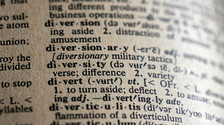John
안ㄴ녕하세요?
In the context of "hit" or "strike" or "bump" how are 맞다, 치다 and 찧다 different or similar. I've seen 치다 used in the context of things like playing piano, tennis or golf (I suspect it holds for things like playing a zither, guitar or drums as well). I get that connection.
I've never seen 찧다 used but it seems to have a similar concept of hitting.
I just came across 맞다 uses in the sense of hit and that is a bit confusing to me. This seems a bit different than the other two -- but perhaps it's more a set phrase. The passage was "...비를 맞으면서 걸어요". (I think that is roughly "walking in the rain". I'm not sure if this is more a set phrase or not though.
I'm wondering how interchangeable the three verbs are and what criteria might best inform on when one is needed or preferred over another.
18 nov. 2021 00:59
Antwoorden · 2
1
to hit sth 치다.
to get hit by sth (passive) 맞다.
비를 맞으면서 걸어요. I'm walking while getting hit by the rain.
to pound sth with sth 찧다.(빻다.)
절구에 쌀을 찧다.(빻다.)
pound rice in a mortar
18 november 2021
Heb je je antwoorden nog steeds niet gevonden?
Schrijf je vragen op en laat de moedertaalsprekers je helpen!
John
Taalvaardigheden
Engels, Filipijns (Tagalog), Koreaans
Taal die wordt geleerd
Filipijns (Tagalog), Koreaans
Artikelen die je misschien ook leuk vindt

Top 6 Mistakes to Avoid with Vocabulary Acquisition
23 likes · 4 Opmerkingen

Navigating Your First Job: Do's and Don'ts in the Workplace
44 likes · 18 Opmerkingen

What Content to Watch to Acquire Advanced-level Proficiency
75 likes · 48 Opmerkingen
Meer artikelen
